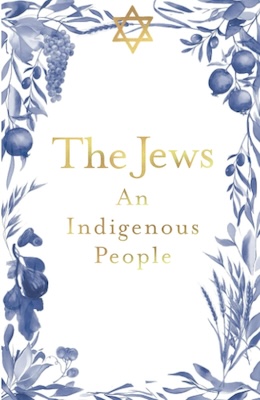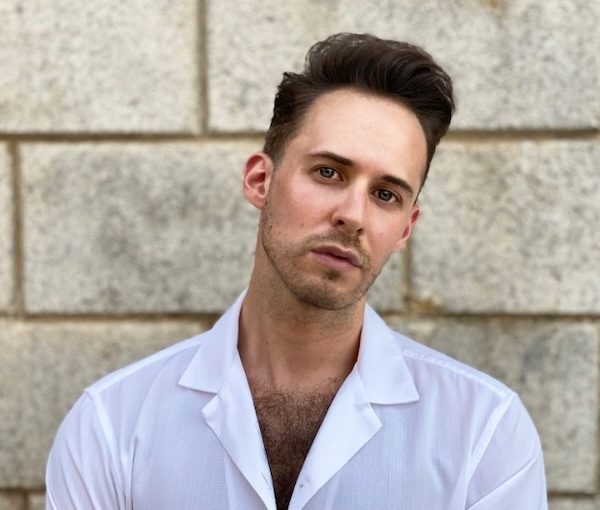Last month, Ben M. Freeman spoke about his latest book, The Jews: An Indigenous People, as part of Kolot Mayim Reform Temple’s 2024/25 speaker series. (PR photo)
Ben M. Freeman, founder of the modern Jewish Pride movement, spoke from his home in London, England, about his work and ideas in a Zoom webinar on Jan. 12. Titled Building Jewish Pride and Recognizing Jewish Indigeneity, the virtual event was hosted by Victoria’s Kolot Mayim Reform Temple.
The author of Jewish Pride: Rebuilding a People and Reclaiming our Story: The Pursuit of Jewish Pride, Freeman’s latest, The Jews: An Indigenous People, will be released this month.
Freeman began by calling into question the perception that indigeneity implies people who have lived on the land and are primitive or oppressed.
“I have great issue with that because the idea of those things being inherent is to destroy the great diversity of the indigenous experience,” he said.
The United Nations, he explained, set up seven criteria used to determine the indigeneity of a people to a particular land. Freeman, in his writings and talks, argues that Jews are indigenous to the land of Israel even by the UN’s criteria.
“[The UN] also created rights for indigenous people: the ability to have self-determination, the ability to practise your own religion, have your own language, all of these different things. But, again, many of them are still rooted in this idea that indigenous people are inherently oppressed,” he said.
“We’re not here to say that indigenous people have not experienced oppression. That would be ludicrous. Many indigenous groups do experience that, but we can’t necessarily say these things are inherent….”
To view certain groups as only victims, he contended, strips them of agency. Freeman would define an indigenous people, rather, as a group whose collective identity begins in one specific land, and it is in that land they remain rooted either physically, spiritually or culturally.
“This is their home and is where they originated, developed and continue to be fixed through a connection to the environment and natural resources, living systems, culture and practice as a people, irrespective of their sovereignty in the land,” he said.
 This definition, Freeman believes, not only applies to Jews in Israel but also refers to the experiences of the Maori in New Zealand and First Nations in Canada, and other peoples in other countries.
This definition, Freeman believes, not only applies to Jews in Israel but also refers to the experiences of the Maori in New Zealand and First Nations in Canada, and other peoples in other countries.
From his perspective, Jews were a small group of tribes that developed into a civilization over time. The Torah played a large part as it codified Jewish civilization by taking practices that already existed, reshaped some of them and retold some of the stories, creating a culture that contains religion.
“Almost all the practices were rooted in the land. Pesach was two different festivals: one was a matzah festival and one was a sacrifice festival. Rosh Hashanah, our new year, was the beginning of the agrarian year. Shavuot is an agricultural holiday,” Freeman said.
“One of the odd experiences of being Jewish is that we exist in this cognitive dissonance almost because we will describe ourselves officially in many ways as a religion, but then we have so much of our practice rooted in land.”
Freeman also put forward that a distinguishing characteristic of Judaism is that, unlike Christianity, it can be a religion but not exclusively a faith or creed.
“Christianity has creed. My partner is a Christian and I sometimes ask him, ‘Could you be a Christian without believing in Jesus?’ And he’s like, ‘no.’ We don’t have that,” said Freeman. “That’s why you can have atheist, secular or agnostic Jews who are part of Am Yisrael. There is nothing we have to believe to be Jews.”
Freeman went on to discuss Jewish pride, which, for him, bears three central tenets. The first is to encourage and empower Jews to reject the shame of antisemitism – to wear one’s Jewishness as a badge of honour.
The second point is to repudiate non-Jewish definitions of Jewish identity.
“I just feel it’s so egregious to me that non-Jews think they have a right to tell us what it means to be Jewish or any aspect of that experience. This is my identity. I will tell you what it means to be a Jew,” he said.
The third tenet is for Jews to go on a journey to explore their identity through a Jewish perspective. “We have to be able to say this is who we are,” he said, “but we have to humbly accept that takes time. We need to be doing real work to investigate our Jewishness and then, most importantly, [do it] through a Jewish lens.”
Freeman is scheduled to travel to Canada in March to discuss The Jews: An Indigenous People, with appearances in Toronto, Windsor and Edmonton. His schedule may include stops in Ottawa and Vancouver, as well.
Next up in the Kolot Mayim 2024/25 lecture series, on March 2, 11 a.m., is Jonathan Bergwerk, author of the Audacious Jewish Lives books, who will speak about Jewish innovators who changed the world. Go to kolotmayimreformtemple.com to register.
Sam Margolis has written for the Globe and Mail, the National Post, UPI and MSNBC.

